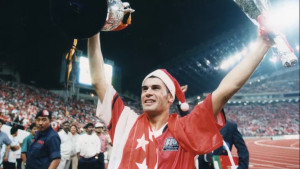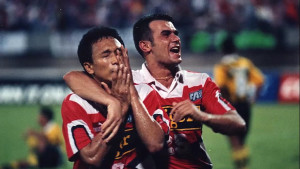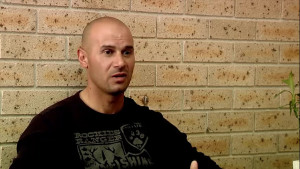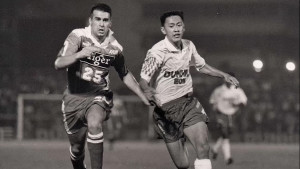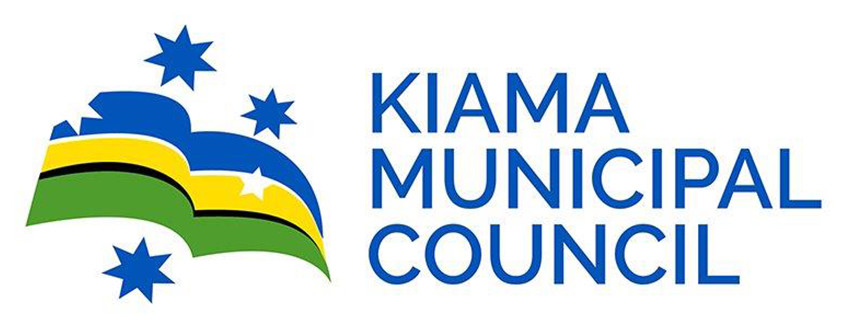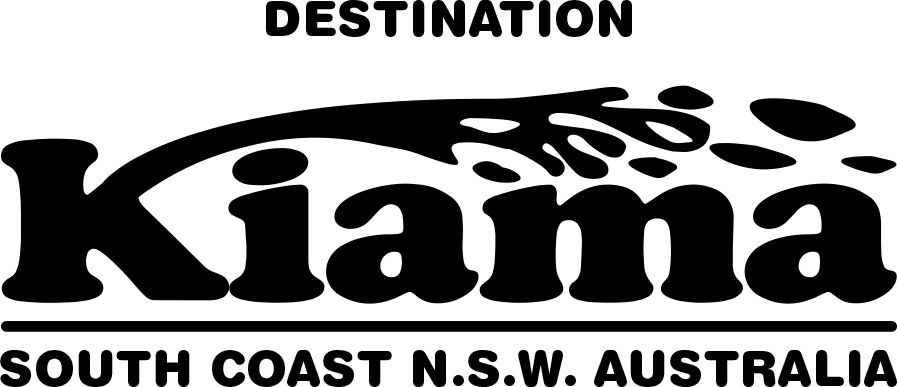Abbas Saad, the current Sydney Olympic first team coach, is a coach who manages as he played.
He encourages attacking football and is intent on letting his players express themselves every time
they go on the park.
Furthermore, his years of playing in the NSL and the Malaysian National League, have equipped him
to understand what is required to dominate the opposition by using his players to maximum effect.
When he was offered the opportunity to take over the first team coaching role, one week before the
season started, he grabbed it with true panache. Now that the first team is on equal points with Apia in first place and only trailing on goal average, the club management’s decision to invest in Saad has truly paid
dividends.
There’s a buzz around the club which hasn’t been evident for a while as the supporters look forward
to watching the team play an exciting brand of football every week.
This shouldn’t be completely surprising from a man, who in his fifteen years in senior football,
scored over ninety goals from a creative and attacking midfield or wide position.
However, Saad’s long term experience in football also reminds him that every week is a different
challenge so he prepares for every game like it his first of the season.
In this interview with Roger Sleeman, Abbas Saad looks back on his playing career in Australia and Malaysia and how it has influenced his coaching philosophy, the great moments of that playing
career, his experience as a top line broadcaster and his coaching career up to date.
ROGER SLEEMAN
When you were a sixteen year old, you were told, like Tim Cahill, you were too small to play senior
football.
Can you relate that story?
ABBAS SAAD
Ironically, I was scouted for Sydney Olympic as a thirteen year old and when I reached sixteen, I
could only graduate to u/20’s because there was no u/18 competition.
This was when I was advised I didn’t have the physical presence to play u/20’s.
I was very despondent at the time but I was fortunate to talk to a schoolmate who was playing for
Sydney City youth team and he took me to the club for a training session to meet Geoff Harcombe
the youth coach and a former Everton defender. By Thursday that week, I was offered a contract.
Also at the club were Eddie Thomson and Mick Hickman, so I couldn’t have asked for greater
coaching influences.
R.S.
Who were your football heros at the time?
A.S.
I worshipped Maradona and Van Basten in world football as they were the complete attacking
players.
Locally, John Kosmina and Marshall Soper were great role models who had great technique and
unlimited bravado.
The other Sydney City players who helped me out at the club were household names; Murray Barnes,
Frank Farina, Alex Robertson and Kenny Boden.
However, the greatest influence was ”Jinky” Joe Watson who was small in stature but displayed
great technique and a quick brain to deceive and beat defenders.
Watson took me under his wing and it only took me three months to play first grade.
R.S.
You were at Sydney City when the club was withdrawn from the NSL at the end of March, 1987.
Can you recall your experience at the time?
A.S.
We played on Sunday against Sydney Olympic and I went straight into a Young Socceroo camp for
three days straight after the game.
I attended training on Thursday night and was told the club had been withdrawn from the League
which was devastating because most of the players didn’t know about it.
Frank Arok wanted to sign me at St George and South Melbourne was also interested.
However, Eddie Thomson had moved to Sydney Olympic at the end of the 1986 season and he
wanted to sign young players.
Luckily, I went with David Barrett and Robbie Hooker to Olympic and had three great seasons there,
culminating in a narrow 1989 grandfinal loss to Marconi when I was awarded the Man of the Match.
R.S.
In 1990 you were signed by the Singapore club to play in the Malaysian National League.
Can you explain the background to this move and your experiences?
A.S.
The Singapore club was looking to sign foreign players and fortunately Alan Vest who had picked me
for NSW youth representation six years before, recommended me to the club.
It was an amazing experience as we would play in front of 85,000 crowds and significantly, the club
never had success before I went there.
I was the first Aussie to play there, so I started the trend for Malaysian League clubs to sign star
performers like Marshall Soper, Alan Davidson, Darren Stewart, Aytek Genc and Scott Ollerenshaw.
The season after, I went to Johore and in those two years we won the League, the Malaysian Cup
and I also won the Golden Boot in my first season there.
When I returned to play for Singapore in the 1994 season, we won the double which caused
euphoria amongst our fans.
R.S.
How does the Malaysian League compare with the A- League?
A.S.
It’s like chalk and cheese and the professionalism is very much like Europe.
The support for the game is fanatical and the players are looked after with housing, cars and great
financial incentives.
The technical level of the players is brilliant but they do lack tactical competence. This maybe the
reason the country is not so successful at national level.
They do have this raw talent and when I was playing there during the 90’s, I was playing against
some gifted performers who were amongst the best I’d played against.
Some players went to Holland, Switzerland and Greece but some didn’t leave because they were
earning big money in their National League.
R.S.
When did you first think about coaching?
A.S.
It never really entered my mind to coach at a high level but I coached juniors at Olympic and was
also involved with the G.I.S. Academy in Singapore.
I got my first taste of senior football at Penrith in the NPL at Penrith from 2004-2006 and in 2009
was Technical Director at Olympic and also coached their u/20’s.
R.S.
Your coaching career was put on hold when you were approached by Singapore T.V. with an
opportunity to commentate.
What happened?
A.S.
In 2008, ESPN Singapore asked me to come over and have a screen test because I was a well-known
identity.
The screen test was successful so they offered me a one month trial and after only a couple of
shows, they gave me a contract.
In the last ten years I’ve covered live; three World Cups, three European Championships, and five
Copa Libertadores Championships and was involved in regular magazine shows.
My co–commentators have included Robbie Fowler, John Barnes, Patrick Berger, Kevin Keegan,
Louis Saha, Andy Cole, Brian Laudrup and Andy Cole.
Money can’t buy these experiences.
R.S.
What is your coaching philosophy?
A.S.
I was a technical player with a free spirit and like to give young players some free rein.
Basic technique is important but self-expression produces creativity.
I like attacking football with an emphasis on possession but it’s the pace of the game which is critical
so I don’t promote a slow possession style.
Yes, we need to keep the ball but it’s what we do with it and critically the players have to be
comfortable on the park.
R.S.
What have been the key elements in your success this year?
A.S.
You’re only as good as the players on the park and how they respond to your instructions to play in a
team environment.
Every player in the squad has played his part and apart from our one loss to Apia, we’ve been very
consistent in our performances.
Nevertheless, we shouldn’t have dropped two points against Rockdale and let them come back to
score two goals in the second half after we dominated the first half.
If we’d been a bit more clinical in the first half and scored more than two goals, they would’ve found
it very difficult to recover in that second half.
However, it’s a learning process for these players and funnily enough, some of them weren’t
considered good enough according to former coaches.
The fact is, if they weren’t talented they wouldn’t be playing NPL football and I’m here to help them
progress from NPL to A-League or even overseas.
R.S.
With the loss of Hagi Gligor for the season, you have a fairly small squad which could affect your
position in the League.
How can you overcome this challenge?
A.S.
Basically, I will have to wait for the transfer window to open on the 20th of May and hope there are
some quality back up players available.
However, I do have a lot of contacts around the country who can recommend me this sort of player
and there’s no doubt players do want to play for Olympic.
Certainly, the next few weeks will be critical in our season.

